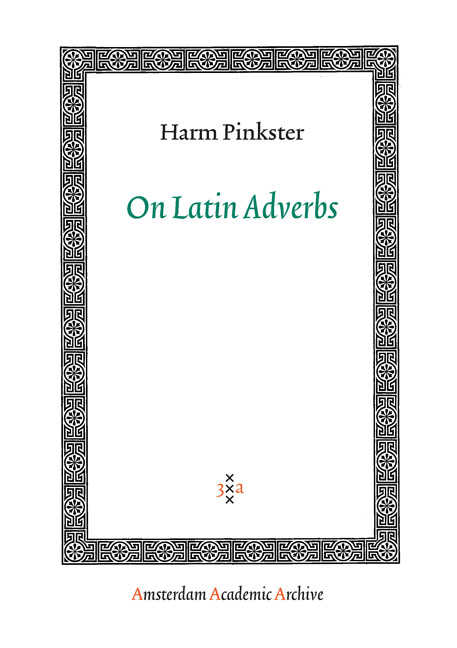Book contents
- Frontmatter
- Preface to this Edition
- Preface
- Contents
- Introduction
- 1 General Problems of Studying a Dead Language
- 2 Problems of Classification
- 3 Adverbs in Roman Grammatical Theory
- 4 The Adverb in Latin Linguistics
- 5 Adverbs as Derived Forms
- 6 Syntactic Problems
- 7 Subclassification of Adverbs
- 8 Adverbs and other Invariables
- 9 The Relationship Between Adverbs and Prepositions
- 10 Adverbs and Connectors
- 11 Adverbs and Subordinators
- Bibliography
- Indices
- Index Auctorum
- Titles Published in the Aaa Series
10 - Adverbs and Connectors
Published online by Cambridge University Press: 24 January 2021
- Frontmatter
- Preface to this Edition
- Preface
- Contents
- Introduction
- 1 General Problems of Studying a Dead Language
- 2 Problems of Classification
- 3 Adverbs in Roman Grammatical Theory
- 4 The Adverb in Latin Linguistics
- 5 Adverbs as Derived Forms
- 6 Syntactic Problems
- 7 Subclassification of Adverbs
- 8 Adverbs and other Invariables
- 9 The Relationship Between Adverbs and Prepositions
- 10 Adverbs and Connectors
- 11 Adverbs and Subordinators
- Bibliography
- Indices
- Index Auctorum
- Titles Published in the Aaa Series
Summary
This chapter will deal with the relationship between certain adverbs and a subclass of so-called coor(Unating conjunctions, which I call connectors!. These connectors are different from both coordinators (ch. 7) and subordinators, which will be dealt with in the next chapter.
Traditionally the category of conjunctions is divided into ‘coordinating’ and ‘subordinating’ conjunctions. German terminology as it appears in Kiihner-Stegmann and Szantyr is rather confusing. The following scheme will perhaps help.
English Kuhner-Stegmann Szantyr
conjunctions Konjunktionen Konjunktionen (= Bindeworter)
coordinating Bindeworter Partikel
subordinating Fiigeworter Konjunktionen
The category of coordinating cdnjunctions is usually subdivided in Latin grammars into four or five subcategories. They are
(i) copulative, e.g. et ('and’), etiam ('also’), adhuc ('yet’);
(ii) adversative, e.g. sed ('but’), quidem. ('at least', ‘certainly’), tamen ('still’), ceterum ('but', ‘on the other hand’)
(iii) disjunctive, e.g. aut ('or’)
(iv) causal, e.g. nam, enim ('for’), tamen ('still', ‘yet’) in Szantyr (p. 497)
(v) consecutive (conclusive, illative), e.g. ergo, igitur, itaque ('thus', ‘therefore’)
These subcategories are distinguished on semantic grounds. Syntactically, however, members of several different subcategories can be shown to behave in a comparable way. One subcategory of such semantically different but syntactically similar words is formed by what I call ‘coordinators'. As such I recognized (7.3.2.) et, atque, ac, -que, cum … tum, et . .. et, ut … ita (copulative coordinators), aut, vel, sive . .. sive, -ve (alternative coordinators) and at and sed (adversative coordinators) . It is clear that ‘coordination’ is meant here in a stricter sense than in the traditional term ‘coordinating conjunction'. Traditionally, everything that is not subordination is called coordination.
By connectors I understand roughly all so-called coordinating conjunctions minus coordinators. I do by no means suggest that connectors have very much in common. I am aware, too, that since the term ‘coordinating conjunction’ is vague ‘minus coordinators’ is vague as well. I would certainly reckon among them autem, nam, enim, ergo, igitur, itaque. Characteristics of the latter three will be discussed below. So far the term ‘connectors’ is intended in the first place as a cover term for several subcategories that are themselves negatively defined. A rough definition might run as follows: connectors are those words which establish various semantic relations between paratactic sentences, are no coordinators, and can be shown not to be adverbs either.
- Type
- Chapter
- Information
- On Latin Adverbs , pp. 153 - 164Publisher: Amsterdam University PressPrint publication year: 2005



